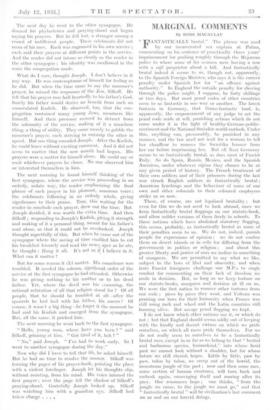MARGINAL COMMENTS
By ROSE MACAULAY "FANTASTICALLY brutal." The phrase was used by our incarcerated sea captain at Palma, commenting on his sentence of practically three years' imprisonment for pushing roughly through the Majorcan police to where some of his seamen were having a row with a café proprietor about a bill. And fantastically brutal indeed it seems to us, though not, apparently, to the Spanish Foreign Minister, who says it is the correct penalty under Spanish law for " an offence against authority." In England the outside penalty for shoving through the police might, I suppose, be forty shillings or two days. But most penal codes of other countries seem to us fantastic in one way or another. The latest fantasia in Germany, that thrice-fantastic land, is, apparently, the empowerment of any judge to set the penal code aside at will, punishing actions which do not come under it in the light of healthy-German-public.. sentiment and the National-Socialist-world-outlook. Under this, anything can, presumably, be punished in any manner, and the law need not wait for a woman to tell her chauffeur to remove the Swastika banner from her car before imprisoning her. But all Nazi Germany seems to us fantastically brutal, as does most of Fascist Italy. So do Spain, Russia, Mexico, and the Spanish Americas, under whatever regime they chance to be at any given period of history. The French treatment of their own soldiers and of their prisoners during the last war struck English soldiers as fantastically brutal ; American lynchings and the behaviour of some Of our own and other colonials to their coloured employees strike us so now.
• These, of course, are not legalized brutality ; but even for this we do not need to look abroad, since we keep fantastically brutal floggings on our statute-book, ,and allow milder versions of them freely in schools. To those nations which have abolished statutory flogging, this seems, probably, as fantastically brutal as some of their penalties seem to us. We do not, indeed, punish people for expressions of opinion ; we do not confine them on desert islands or in cells for differing from the government in politics or religion ; and about this greater liberty and justice of ours we incline to something of smugness. We are permitted to say what we like, subject to the laws of libel and obscenity, and when irate Fascist foreigners challenge our M.P.s to single combat for commenting on their lack of freedom we smile in derision. But, so long as we keep torture on our statute-books, Smugness and derision sit ill on us; We were the first nation to remove other tortures from our code ; piece by piece they went, and Voltaire was praising our laws for their humanity when France was still using rack and wheel and the Latin countries still burning alive. But savage penal flogging we kept.
I do not know which other nations use it, or which do not ; but that England should seems oddly out of keeping with the kindly and decent virtues on which we pride ourselves, on which all races pride themselves. For we do not really seem to ourselves to be a fantastically brutal race, except in so far as we belong to that " bestial and barbarous species, humankind," into whose lurid past we cannot look without a shudder, but for whose future we still cherish hopes. Little by little, paw by paw, talon by talon, we creep out of the horrid, the Monstrous jungle of the past ; now and then some race, some section of human creatures, will turn back and embosk again, ensavaging itself and roaring after its prey. One renounces hope ; one thinks, " from the jungle we came, to the jungle we must go," and that " fantastically brutal " will be civilization's last comment on us and on our horrid doings.










































 Previous page
Previous page